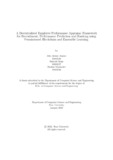| dc.contributor.advisor | Alam, Md. Golam Rabiul | |
| dc.contributor.author | Anjum, Afra Antara | |
| dc.contributor.author | Islam, Sadaath | |
| dc.contributor.author | Majumder, Shaikat | |
| dc.date.accessioned | 2022-06-08T06:41:02Z | |
| dc.date.available | 2022-06-08T06:41:02Z | |
| dc.date.copyright | 2022 | |
| dc.date.issued | 2022-01 | |
| dc.identifier.other | ID 18101220 | |
| dc.identifier.other | ID 18101227 | |
| dc.identifier.other | ID 18101630 | |
| dc.identifier.uri | http://hdl.handle.net/10361/16947 | |
| dc.description | This thesis is submitted in partial fulfillment of the requirements for the degree of Bachelor of Science in Computer Science and Engineering, 2022. | en_US |
| dc.description | Cataloged from PDF version of thesis. | |
| dc.description | Includes bibliographical references (pages 87-91). | |
| dc.description.abstract | Recruitment is a crucial task for Human Resource Management (HRM) and determines
the creation of a competent workforce that eventually brings tangible and
intangible benefits for companies. Employees are key elements in determining a company’s
success and employees perform well when their skill set complements their
job requirements. However, the current system fails to provide a single solution that
verifies employee records and predicts employee-company compatibility. This paper
proposes an recruitment system using a private permissioned blockchain architecture
and ensemble learning algorithms. The paper proposes a permissioned blockchain
architecture using permission protocol and smart contracts to store employee records
in an immutable ledger. Development of Data and processing decentralization is inspired
and in accordance with the Hyperledger Fabric system design, thus creating
a decentralized data sharing system that is used to hold comprehensive employee
performance records in a peer-to-peer system that allows employee data verification
and retrieval by organizations in the blockchain consortium. The applicant records
and previous performance appraisal records can be retrieved by a company in the
consortium following smart contract rules and can be used to predict employee performance
ratings based retrieved previous performance appraisal records. To predict
the performance score, we used machine learning models namely supervised and ensemble
learning. The system also ranks eligible candidates, based on predicted
performance scores and other relevant applicant data via Multi-Criteria Decision
Making Algorithm (MCDM). Finally, a Streamlit application is created where performance
score predicting and ranking are done automatically with a suitable user
interface for final result output. | en_US |
| dc.description.statementofresponsibility | Afra Antara Anjum | |
| dc.description.statementofresponsibility | Sadaath Islam | |
| dc.description.statementofresponsibility | Shaikat Majumder | |
| dc.format.extent | 91 pages | |
| dc.language.iso | en | en_US |
| dc.publisher | Brac University | en_US |
| dc.rights | Brac University theses are protected by copyright. They may be viewed from this source for any purpose, but reproduction or distribution in any format is prohibited without written permission. | |
| dc.subject | Human resource management | en_US |
| dc.subject | Blockchain | en_US |
| dc.subject | Recruitment | en_US |
| dc.subject | Ensemble learning | en_US |
| dc.subject | Decision tree | en_US |
| dc.subject | Performance appraisal | en_US |
| dc.subject | Random Forest (RF) | en_US |
| dc.subject | Recursive feature elimination | en_US |
| dc.subject | Permission protocol | en_US |
| dc.subject | Smart contracts | en_US |
| dc.subject | Hyperledger fabric | en_US |
| dc.subject.lcsh | Business logistics | |
| dc.subject.lcsh | Machine learning | |
| dc.subject.lcsh | Artificial intelligence | |
| dc.title | A decentralized employee performance appraisal framework for recruitment, performance prediction and ranking using permissioned Blockchain and ensemble learning | en_US |
| dc.type | Thesis | en_US |
| dc.contributor.department | Department of Computer Science and Engineering, Brac University | |
| dc.description.degree | B. Computer Science | |

